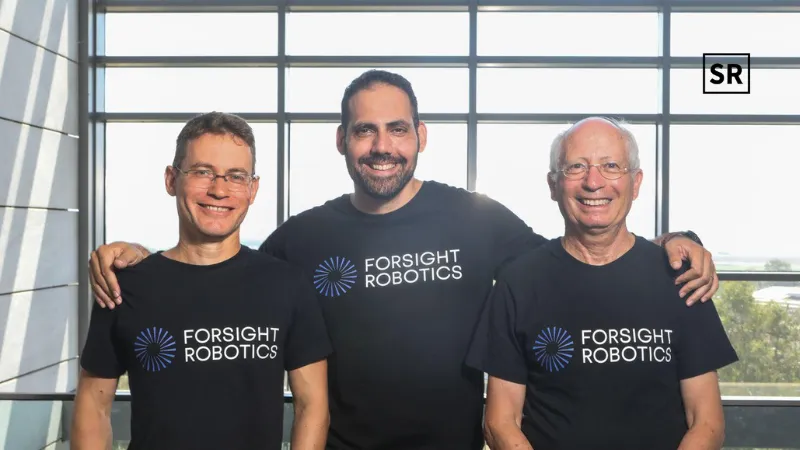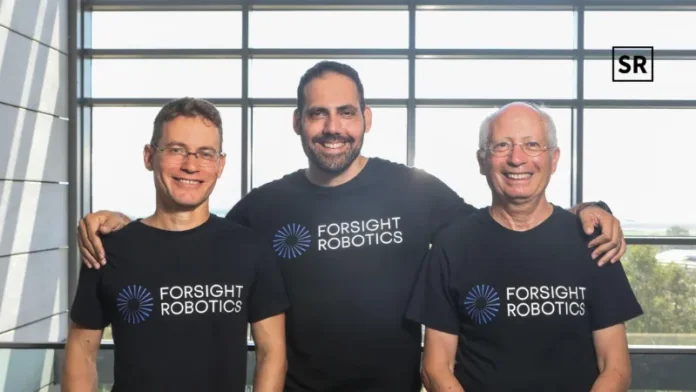
An Israeli company called ForSight Robotics has raised $125 million from investors. The funding round was led by a group called Eclipse. This money will help the company continue building its special robot system for eye surgery, called ORYOM.
The ORYOM robot is being designed to do eye surgeries—like cataract surgery—with more accuracy than ever before. It could also help treat other common eye problems. The goal is to make eye care more accessible and to make surgery easier for doctors. The company plans to start testing the robot on real patients later this year.
ForSight Robotics was started in 2020 by Prof. Moshe Shoham, Dr. Daniel Glozman, and Dr. Joseph Nathan. Right now, the company is based in Yokneam, Illit, but it will soon move to Caesarea. So far, ForSight has raised a total of $195 million and has 110 employees working in Israel.
Along with Eclipse, other big names also invested in this funding round. These include a major company partner, Dr. Fred Moll—known as the “father of surgical robots”—India’s Adani Group, Reiya Ventures, and some of the company’s earlier investors. ForSight has already done hundreds of successful tests on animals and is now getting ready to start using its robot for cataract surgeries in humans.
“We finalized the round while missiles were flying into Israel. Twenty per cent of our team is in the reserves; we support them and their families deeply,” Natahn told the media. “We’ve faced COVID, economic crises, and now war. Still, we secured backing from some of Silicon Valley’s largest funds in both our Series A and B. Our uniqueness is stronger than the challenges around us.”
Dr Nathan emphasized that the round represents a strong vote of confidence from a key industry player: “A strategic company in our space invested a substantial amount but entered only as a financial partner; I’m not tied to them strategically. All funds go to the company and are not contingent on milestones.”
The new money will help ForSight get the approvals it needs from health regulators, start working in the U.S., and get ready to sell its product. “I believe we’ll be able to bring it to market in the next few years once we get all the approvals from the FDA,” said Dr. Nathan.
“There’s no existing robotic solution in ophthalmology. We are reengineering eye surgery. Instead of a surgeon manually operating tools, they’ll sit at a console and guide robots to perform the procedure with far greater precision and comfort. Surgeons will be able to do more procedures with better ergonomics. Today, 66% of ophthalmic surgeons suffer from spinal injuries due to physical strain; our platform helps solve that.”
From a patient’s perspective, he added, “They know they’re getting the highest quality care.”
The global vision crisis, affecting over one billion people with preventable vision impairment and avoidable blindness, is exacerbated by a limited and declining ophthalmologist workforce. Worldwide, there are only 31.7 ophthalmologists and 14.1 cataract surgeons per million people. By 2035, the number of practicing ophthalmologists is expected to decline by 12%, while demand for eye care is projected to rise by 24%. Simultaneously, more than 600 million people suffer from cataracts, yet only 30 million receive surgical treatment. In the United States alone, just four million cataract surgeries are performed annually, underscoring the significant gap between patient need and available surgical capacity.
The ORYOM system is built to perform very accurate and consistent eye surgeries, starting with cataract surgery. It uses smart AI, advanced computer vision, and tiny mechanical parts to move with great control.
This helps make the surgery safer and easier while also reducing the physical strain on doctors.
“Cataracts are part of aging, and rates are rising with obesity and diabetes. But many surgeons are retiring, and there’s not enough new talent entering the field,” Nathan noted. “This gap will only grow.”
Dr Nathan says this Series B funding is one of the biggest medical investments in Israel in recent years, which is especially impressive given the challenging times.
“We see ophthalmology as the next frontier in medical robotics, just like general surgery was before Intuitive Surgical revolutionized it with the da Vinci system. It’s a massive market with urgent global needs.”
ForSight Robotics has some well-known experts helping guide the company. Their advisory board includes Dr. Fred Moll, who started Intuitive Surgical and created the famous da Vinci surgical robot, and Rony Abovitz, who founded MAKO Surgical. Dr. Moll has also recently joined the company’s board of directors.
The company also gets advice from top eye doctors around the world, including Dr David Chang, Dr Vance Thompson, Prof. Boris Malyugin, Dr Sam Garg, and Dr Modi Naftali.
Read more- Medtech Startup Innovodigm Raises INR 5.5 Crore in Seed Funding Round





